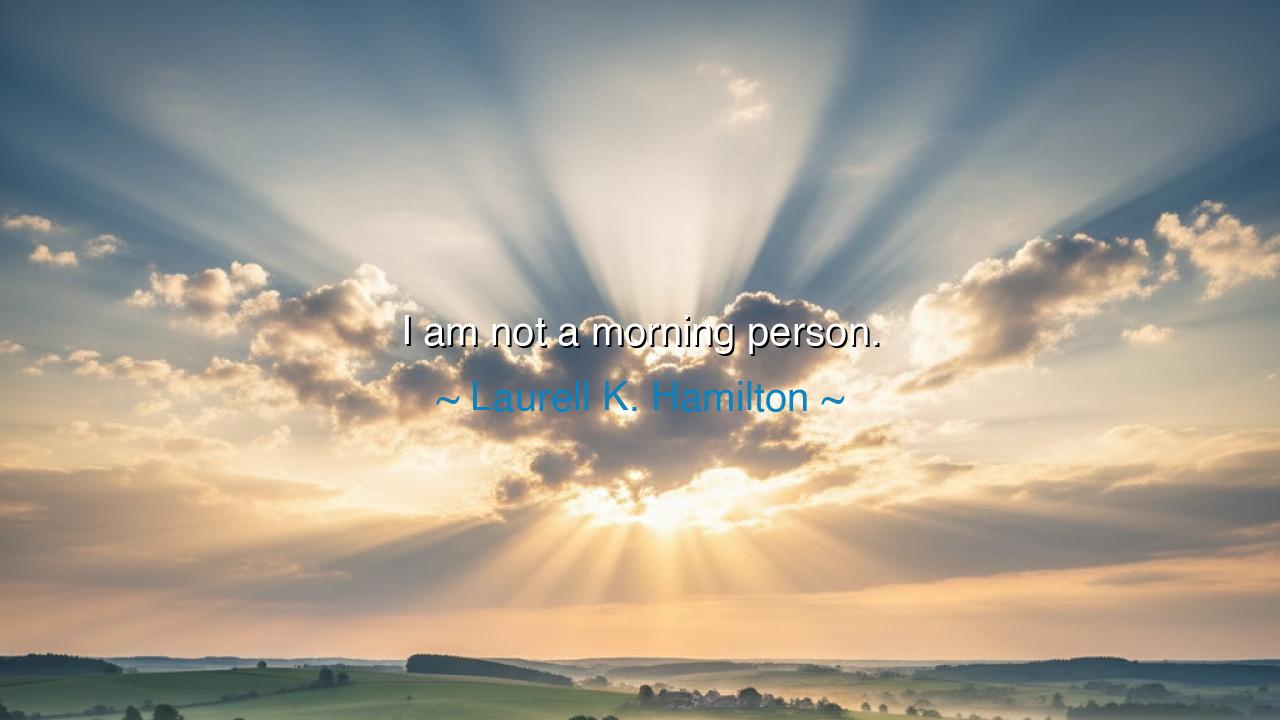
I am not a morning person.






When Laurell K. Hamilton declared, “I am not a morning person,” her words, though plain, carry a deeper wisdom about the nature of human rhythm and the uniqueness of each soul. It is a confession both simple and profound, for it reminds us that not all are fashioned alike, nor do all rise with the same fire at dawn. In these few words lies the struggle of countless men and women who have been told that virtue belongs only to those who rise early, yet who find their power awakening not with the sun, but later, when the day has already begun its course.
To say, “I am not a morning person,” is to acknowledge that the spirit has its own seasons, its own tides. For some, the dawn is a friend, whispering inspiration and clarity as the world awakens. For others, the dawn is a burden, a weight pressing upon tired limbs and clouded minds. Hamilton’s words do not despise the morning, but they honor honesty—they tell us that wisdom is found not in forcing the soul into shapes that do not fit, but in discovering when one’s strength is most alive and using it well.
The ancients themselves spoke of this truth, though in different terms. The Greeks believed in temperament, that each person was guided by humors and elements—fire, air, water, and earth. One might thrive in the stillness of morning, another in the silence of night. To deny one’s nature was to invite imbalance. And so Hamilton’s confession, light as it seems, is a reminder of ancient wisdom: that each person must learn the rhythm of their own being, and not force themselves into patterns built for others.
Consider the life of Winston Churchill, the leader who stood firm against tyranny in the Second World War. He too was no morning person. While others began their labor at dawn, Churchill often worked deep into the night, drafting speeches, planning strategies, and writing letters. He would rise late, yet his productivity and brilliance were undeniable. His enemies trembled not because he rose early, but because he used his natural hours of strength to full advantage. His example proves that greatness is not tied to the clock of the majority, but to the discipline of knowing oneself.
Yet let us not misunderstand. To say one is not a morning person is not to excuse laziness, nor to flee from discipline. It is, instead, to honor the truth of one’s own cycle and to build habits that match it. If your strength awakens in the afternoon, then guard those hours fiercely, and pour your labor into them as though they were sacred. If your clarity blooms at night, then shape your life to use that time wisely. The lesson is not to despise morning, but to embrace the reality of who you are and to labor faithfully when your spirit is most alive.
There is also humility in such words. To confess, “I am not a morning person,” is to admit limitation. It is to acknowledge that one cannot master every hour, that perfection is not demanded of us. Instead, we are called to be faithful stewards of the time that is truly ours. In this humility lies strength, for the one who knows their weakness may guard against it, and the one who knows their strength may wield it well.
Therefore, let us draw this teaching into our lives: seek to know your rhythm. Ask yourself when your mind is sharpest, when your spirit is brightest, when your labor flows most freely. Then shape your days to honor that rhythm. Do not waste your best hours on triviality, nor force yourself into molds that belong to others. Rise when you must, but work with fire when you can. This is the path not only to productivity, but to peace, for it aligns the self with its truest nature.
Thus Hamilton’s simple declaration becomes more than personal preference; it becomes an ancient reminder that wisdom begins with self-knowledge. To know whether you are a child of the dawn or a servant of the twilight is to know the first law of mastery: that power comes not from imitating the habits of others, but from walking faithfully in the rhythm of your own soul.






AAdministratorAdministrator
Welcome, honored guests. Please leave a comment, we will respond soon